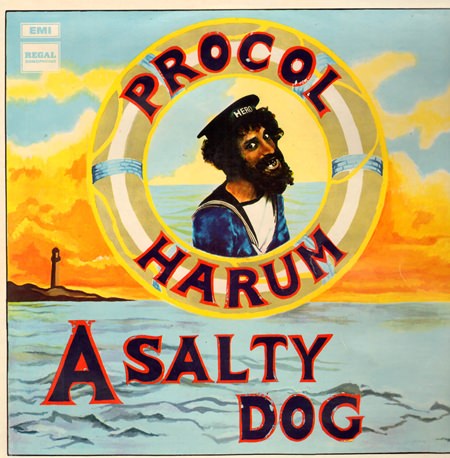 Procol Harum: A Salty Dog (Regal Zonophone) – Released: June 1969
Procol Harum: A Salty Dog (Regal Zonophone) – Released: June 1969
An eccentric and puzzling band that never resembled anyone but themselves. Put a Procol Harum disc on your turntable and you know right away it’s them. I can’t really explain what their secret is, but it should be possible to shed light on some of the components that defines their uniqueness.
Gary Brooker’s voice is definitely one of the band’s signature sounds. His timbre may at first appear to be a raspy grumble with a limited range, but then he throws his head back and hits notes that defy reason. The voice is overwhelmingly expressive. And because Keith Reid’s lyrics are so mysterious, the Brooker accentuation and phrasing becomes your only signpost in forest of dark shadows and strange occurences. Brooker’s voice is spellbinding enough in itself. But then there’s the music:
Brooker’s piano playing is a strange mixture of classical notes, clear as ice, dripping from his fingers and fiery rhythm & blues chords. He is cookin’ in the club and going epic all on the same album, quite often even in the same song. Out on the opposite wing you find the late night, early morning blue, blue wistful organ notes of Matthew Fisher. A poet of the keys carrying both Bach and Goethe’s young Werther in his chest. Fisher makes the music soar.
Procol Harum’s got two anchors that keep them firmly rooted to the ground. The droning, fat blues guitar of Robin Trower is growling ominously under rhe beautiful musical surface and rips everything apart when it takes off on those characteristic solo runs, so brutal that you would expect it to appear inappropriate in such surroundings, but it doesn’t, on the contrary, that blistering drone is a crucial part of Procol Harum’s unique expression.
And to keep it all together, B.J. Wilson, the ten armed, low seated drummer. To see him hit the skins is an experience in itself (check YouTube), to hear him is intoxicating. He owns the tunes, he is their flickering soul.
Why so many words on the band and none on the album? Well, these words are especially relevant when you focus on “A Salty Dog”, because it was here on their third album (the last with the classic lineup) that all ingredients mentioned came together in a higher unity.
You can pick any Procol Harum album as your personal favourite, that is OK, but it will allways have to be measured against “A Salty Dog”, the fulfillment of Brooker/Reid’s master plan, its magnitude can not be surpassed. This is where it all came together, this is what they build the band’s future on. Fisher quit, and later Trower did too. But the overall sound did not change that much.
With few exceptions, any Procol Harum album is a blessing from start to finish. But none more than “A Salty Dog”. 1969 was a great year for albums and “A Salty Dog” is one of the greatest of them all. Why didn’t it sell a gazillion copies? Now that is a mystery to me.
For a start just check out the title track on YouTube. It is one of the most beautiful songs any band has given the world, so stunning it hurts.
Side One
1.”A Salty Dog” (Brooker/Reid) 4:41
2.”The Milk of Human Kindness” (Brooker/Reid) 3:47
3.”Too Much Between Us” (Brooker/Trower/Reid) 3:45
4.”The Devil Came from Kansas” (Brooker/Reid) 4:38
5.”Boredom” (Fisher/Brooker/Reid) 4:34
Side Two
1.”Juicy John Pink” (Trower/Reid) 2:08
2.”Wreck of the Hesperus” (Fisher/Reid) 3:49
3.”All This and More” (Brooker/Reid) 3:52
4.”Crucifiction Lane” (Trower/Reid) 5:03
5.”Pilgrim’s Progress” (Fisher/Reid) 4:32
Musicians and production:
Gary Brooker: vocals, piano, celeste, three stringed guitar, bells, harmonica, recorder, wood
Robin Trower: lead guitar, vocals (track 4, side 2), acoustic guitar, sleigh tambourine
Dave Knights – bass guitar
B.J. Wilson: drums, conga drums, tabla
Matthew Fisher: organ, vocals (track 5, side 1, and tracks 2 and 5, side 2), marimba, acoustic guitar, piano, recorder, rhythm guitar
Kellogs: bosun’s whistle, refreshments
Keith Reid: words
Orchestral arrangements: Gary Brooker (track 1, side 1 and track 3, side 2), Matthew Fisher (track 2, side 2)
Produced by Matthew Fisher
Engineered by Ken Scott (tracks 1–5, side 1 and 3–5, side 2), Ian Stuart (track 1, side 2) and Henry Lewy (track 2, side 2)
 |
 |
 |





